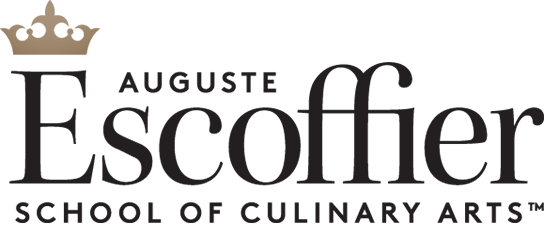“People like to ask ‘how can you do culinary school online? It doesn’t make any sense!’ But Escoffier has it down to a tee. The way they have the program laid out is perfect.”*

DEGREE IN
Holistic Nutrition and Wellness
ONLINE PROGRAM
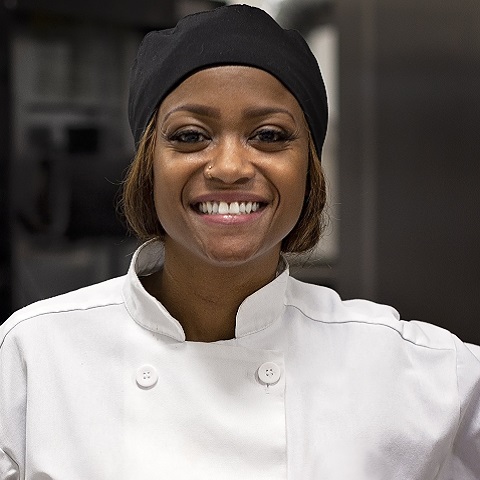
Tiffany Moore, ESCOFFIER online GRADUATE
meet escoffier chef-in-residence
Kristen Kish is the host of Top Chef and Escoffier’s new Chef-in-Residence. Chef Kish will help inspire Escoffier students through a special lecture class, exclusive content, and other engagement activities. About Kristen Kish
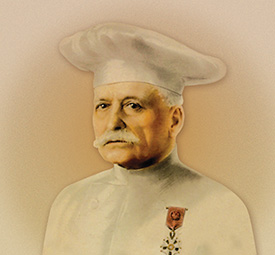
Did you Know?
Auguste Escoffier was known as the King of Chefs and the Chef of Kings!
His contributions to the culinary world include, but are not limited to: creating the menu, designing the five mother sauces, promoting farm-to-table cuisine, and instituting sanitation standards. His influence on cuisine is felt in kitchens across the world nearly a century later!
BEST COLLEGES FOR CULINARY ARTS
Ranked one of the Best Colleges for Culinary Arts in America in 2026 by Niche.com
*Based on comparable student population data for Austin and Boulder as currently reported in Integrated Postsecondary Education Data System (IPEDS).
Kristen, Online Culinary Arts Student*
Your Goals, Your Passion, Your Future
Our Mission
To cultivate passion and lifetime careers in food, hospitality and health by offering affordable, accessible and socially minded education and opportunities to learn.
Accreditations & Associations
We are the only U.S. accredited institution offering 100% online degrees with culinary classes and hands-on industry externships!1
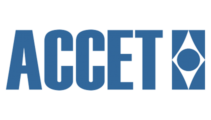
U.S. Department of Education Recognized Agency
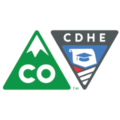
Colorado Department of Higher Education

National Council for State Authorization Reciprocity Agreements
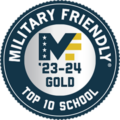
2023-2024 MILITARY FRIENDLY®️ SCHOOL
Our online programs are available through the Boulder campus. Auguste Escoffier School of Culinary Arts in Boulder, Colorado is nationally accredited by the Accrediting Council for Continuing Education and Training (ACCET).
It is also approved and regulated by the Colorado Department of Higher Education (CDHE), Division of Private Occupational Schools. Auguste Escoffier School of Culinary Arts (Boulder, CO) has been approved by CDHE to participate in the National Council for State Authorization Reciprocity Agreements (NC-SARA).

“We start talking to you about your externship course really early in the process of becoming a student with us. We want to help you find what the right externship is for you based on your career goals and we help you to find those career goals early on, so you can understand what you want to do with your externship.”
PATRICIA SOUZA, VICE PRESIDENT, CAREER SERVICES AT ESCOFFIER
Curriculum
Multiple classes can occur during one 6-week session.
Culinary Foundations I
This course begins with food safety and sanitation in the professional kitchen, including proper hygiene, food handling, food storage, cleaning, pest control, in a food service operation. Students become acquainted with tools, utensils, and equipment in professional food service and discuss kitchen layout. Fundamental knife skills, cutting techniques, and the concept of mise en place are covered. Production of stocks, soups are included along with an introduction to grain and legume cookery. And introduction to the role of heat in various cooking techniques rounds out a foundational knowledge in culinary arts.
Culinary Foundations II
This course offers a deeper level continuation of understanding of foundational culinary skills. Students will be introduced to various dry-heat, moist-heat and combination-heat cooking techniques, as well as understand the role of the five Mother Sauces in cuisine. A greater emphasis on knife cuts and accuracy is focused upon, and plating and presentation are introduced to give students the basic skills necessary to advance in a culinary arts education.
Holistic Nutrition
This course covers the basic principles of human nutrition, emphasizing nutrients, food sources, and their role in growth, development, maintenance, and general health. Contemporary and global nutritional issues are also discussed.
Fundamentals of Healthy Baking
This course introduces the student to proper scaling and measuring in the bakeshop, formula conversion, ingredient function and identification, mixing methods and substitutions for nutritionally based recipes that rival the classics.
Purchasing & Cost Control
Mismanagement of financial resources often causes the failure of new foodservice ventures in the early years of their operations. This course covers the money management skills necessary to not only stay in operation, but to turn a profit. Purchasing, receiving, inventory management and menu pricing are covered with a focus of minimizing costs while maintaining a full range of customer services.
Menu Design
This course explores creation and application of various types of food and beverage menus. The course covers all aspects of menu planning and design, ranging from visual design to price analysis to making use of available resources. The menu is both a financial tool and a communication tool, and students learn about its uses as both.
Nutritional Cooking & Special Diets I
This course focuses on adjustment of classical cooking methods and techniques to obtain more nutritious foods as part of the overall diet. Emphasis is placed on the characteristics, functions, and food sources of the major nutrients and other important nutritional compounds and how to maximize nutrient retention in food preparation and storage.
Nutritional Cooking & Special Diets II
This course expands on the knowledge gained in Nutritional Cooking & Special Diets I to focus specifically on modification of classical cooking techniques to achieve nutritionally sound menus which focus on addressing disease prevention and/or supporting health in those with certain diagnoses.
Exploring Wellness Concepts I
This course explores wellness related concepts and how these practices contribute to the whole being. Emphasis is placed on the theory of each concept, discussing real world examples and identifying opportunities for coaching within appropriate scenarios. Finally, students will look at their behaviors in the context of trying to live to be over 100 years old and make recommendations to themselves to help achieve a long, pleasant aging experience.
Exploring Wellness Concepts II
This course builds upon the topics discussed in Exploring Wellness Concepts I and explores additional topics related to wellness including sleep, stress management, mindfulness, meditation, herbology and Eastern healing. The course culminates with a client-based case study incorporating multiple concepts learned in the course.
Coaching Techniques & Practices
This course utilizes psychology-based concepts to help students prepare for roles as health coaches. Emphasis is based on transformative learning and the interpersonal influence of the coach to help clients meet goals that previously were out of reach.
Entrepreneurship
This course is a culmination course in entrepreneurship. This course covers such topics as business planning, pricing, credit management, government regulation, and legal concerns. Business ethics and the crucial role and importance of management and leadership are also covered.
World History and Culture from a Culinary Perspective
Throughout history, food has done more than just provide nourishment. From prehistoric times to the present day, food and the pursuit of it has had a transformative role in human history. Food has impacted society organization, industrial development, military conflict, and economic expansion. As epicure and gastronome Jean-Anthelme Brillat-Savarin stated, “Gastronomy governs the whole of the human man.” This course examines the role of food and its contribution and influence over history, culture, religion, economics, and politics.
Foodservice Math & Accounting
All foodservice managers, regardless of the type of foodservice business with which they are involved, must understand and manage the costs associated with operating their businesses. Foodservice Math & Accounting introduces students to managerial accounting and cost control concepts and explains their applications to specific operations within the hospitality industry. Emphasis is placed on how to administer accounting procedures to minimize costs and maintain a full range of customer services.
After a summary of the fundamentals of culinary math, an overview of basic business cost control functions are covered including expenses, revenue, food, beverage, labor, and other controllable and non-controllable costs. Income statements and profit analysis are covered as well.
Introduction to Psychology in the Workplace
The goals of psychology are to describe, explain, predict, and influence behavior and mental processes. With these goals in mind, students will study the scientific process and learn to explain psychological phenomena. They will learn about how those phenomena fit into major psychological theories, and how to practically apply the ideas of psychology.
Business and Professional Communications
The Business and Professional Communications course emphasizes the principles and practical application of effective professional communication behaviors within professional, business, and organizational contexts. In addition to identifying the importance of effective communication skills to the hospitality industry, communication styles and effective listening methods are addressed.
Listening skill, verbal and nonverbal communication, conflict resolution, cultural differences in communication, and debate techniques are also covered.
Advanced Holistic Nutrition
This course establishes a foundation for managing a client’s metabolic and wellness needs through nutrition, hydration, sleep, exercise, stress management, and environmental considerations. The course culminates in a personal assessment of these contributors to overall wellness and a case study that takes all of these realms into account and brings them into balance.
Externship I
This course provides opportunities for real life experiences in an operational restaurant or related business and builds on the skills and techniques covered in previous courses. In the course, students apply the skills they have learned in practical ways to real-world situations. Students gain hands-on experience in the kitchen that mirrors their future work in the industry while developing necessary career skills. Immersion in a work environment also allows students to develop industry contacts and build working relationships.
Externship II
This course provides opportunities for real life experiences in an operational restaurant or related business and builds on the skills and techniques covered in previous courses. In the course, students apply the skills they have learned in practical ways to real-world situations. Students gain hands-on experience in the kitchen that mirrors their future work in the industry while developing necessary career skills. Immersion in a work environment also allows students to develop industry contacts and build working relationships.
Students can first complete the Diploma in Holistic Nutrition and Wellness online program and then add the remaining course requirements to complete the Associate Degree in Holistic Nutrition and Wellness online program.
Intro
Completed Diploma in Holistic Nutrition and Wellness Online Program
*When a student completes the Diploma in Holistic Nutrition and Wellness online program prior to enrolling into the Associate Degree program.
Courses for Diploma in Holistic Nutrition and Wellness Online Program consist of:
Culinary Foundations I
Culinary Foundations II
Holistic Nutrition
Fundamentals of Healthy Baking
Purchasing & Cost Control
Menu Design
Nutritional Cooking & Special Diets I
Nutritional Cooking & Special Diets II
Exploring Wellness Concepts I
Exploring Wellness Concepts II
Coaching Techniques & Practices
Entrepreneurship
Externship I
World History and Culture from a Culinary Perspective
Throughout history, food has done more than just provide nourishment. From prehistoric times to the present day, food and the pursuit of it has had a transformative role in human history. Food has impacted society organization, industrial development, military conflict, and economic expansion. As epicure and gastronome Jean-Anthelme Brillat-Savarin stated, “Gastronomy governs the whole of the human man.” This course examines the role of food and its contribution and influence over history, culture, religion, economics, and politics.
Foodservice Math & Accounting
All foodservice managers, regardless of the type of foodservice business with which they are involved, must understand and manage the costs associated with operating their businesses. Foodservice Math & Accounting introduces students to managerial accounting and cost control concepts and explains their applications to specific operations within the hospitality industry. Emphasis is placed on how to administer accounting procedures to minimize costs and maintain a full range of customer services.
After a summary of the fundamentals of culinary math, an overview of basic business cost control functions are covered including expenses, revenue, food, beverage, labor, and other controllable and non-controllable costs. Income statements and profit analysis are covered as well.
Introduction to Psychology in the Workplace
The goals of psychology are to describe, explain, predict, and influence behavior and mental processes. With these goals in mind, students will study the scientific process and learn to explain psychological phenomena. They will learn about how those phenomena fit into major psychological theories, and how to practically apply the ideas of psychology.
Business and Professional Communications
The Business and Professional Communications course emphasizes the principles and practical application of effective professional communication behaviors within professional, business, and organizational contexts. In addition to identifying the importance of effective communication skills to the hospitality industry, communication styles and effective listening methods are addressed. Listening skill, verbal and nonverbal communication, conflict resolution, cultural differences in communication, and debate techniques are also covered.
Advanced Holistic Nutrition
This course establishes a foundation for managing a client’s metabolic and wellness needs through nutrition, hydration, sleep, exercise, stress management, and environmental considerations. The course culminates in a personal assessment of these contributors to overall wellness and a case study that takes all of these realms into account and brings them into balance.
Externship II
This course provides opportunities for real life experiences in an operational restaurant or related business and builds on the skills and techniques covered in previous courses. In the course, students apply the skills they have learned in practical ways to real-world situations. Students gain hands-on experience in the kitchen that mirrors their future work in the industry while developing necessary career skills. Immersion in a work environment also allows students to develop industry contacts and build working relationships.
Additional Opportunities For Students

International Study Opportunities in France
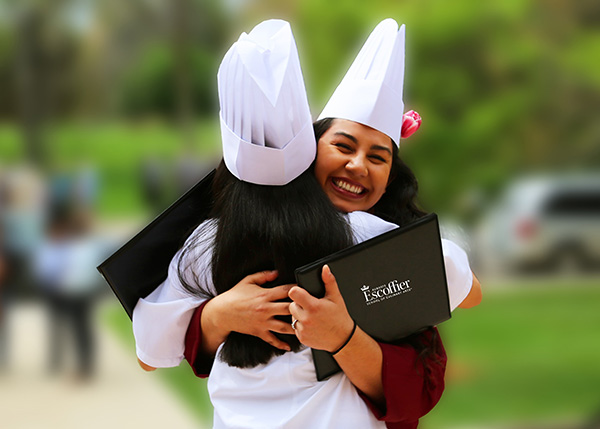
Annual graduation in Boulder, CO

Farm to Table® workshops throughout the year
Program Highlights

Professional Instruction

Entrepreneurial & business-focused

nutrition & wellness focus

100% ONLINE CLASSES WITH hands-on INDUSTRY EXTERNSHIPS

PRACTICAL SKILLS & OPERATIONAL AWARENESS

CAREER PLANNING
AND PREPARATION

EMPHASIS ON FOODSERVICE MANAGEMENT & COST CONTROL

NATIONALLY ACCREDITED

KITCHEN LAB: HANDS-ON ASSIGNMENTS

“Having access to the school online means it is now possible to receive the […] education I always desired, while still being able to grow my business and take care of my busy family.”*
Kristen Douglas, escoffier online graduate
Tuition
TOTAL PROGRAM COST:
$35,145*
*The total program cost listed above encompasses tuition, tool kit, uniform, and an optional non-refundable technology fee if you do not already have a computer. As textbooks are delivered electronically, the cost of books used in the program and available online to the students are included in the tuition cost. For more cost details, refer to our catalog.This is the tuition with the Associate Degree taken fully online. When a student is enrolling into the Associate Degree program as a graduate from the Diploma in Holistic Nutrition and Wellness online program, after qualified transfer credits, the remaining tuition is estimated based on the current rate at the time of transfer. The courses that would qualify for transfer into Restaurant Operations would be: Foodservice Management, Purchasing and Cost Control, and Menu Design.
FINANCIAL AID IS AVAILABLE FOR THOSE WHO
APPLY & QUALIFY.
School Code: 037763
How Online Culinary School Works
A Typical Week at Escoffier
Approximately 15-23 hours per week is spent on school related activities depending on program, credential and personal pace.
The week runs from Wednesday to Tuesday with weekly due dates for student work.
Each week’s assignments will be broken into categories of learn, discuss and experience.
LEARN
Each week will begin with assigned reading via our online platform. Students will also watch the recorded chef demos for the week here.
DISCUSS
Students participate in discussion boards where the class responds to topics and questions the chef posts in regards to what you’re learning that week. There will also be live lessons held through a video platform each week. Live Sessions are your opportunity to interact with your chef and classmates. Students who attend or watch the archive generally perform better in school.
EXPERIENCE
This is where students turn their kitchen into their classroom lab, and cook! With all the prep work completed, students can now work through assignments by following our production sheet from start to finish, taking photos where instructed to.
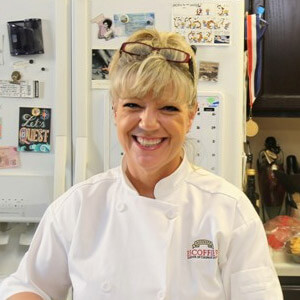
“I would absolutely recommend Escoffier. It’s affordable, it’s flexible, and it’s comprehensive.”*
Laura DeVries, Online Culinary Arts Graduate
1Our Boulder, CO campus is the only accredited institution in the United States to offer both fully online diploma and degree programs with culinary classes and hands-on industry externships. We are accredited by ACCET – A Partnership for Quality®️. ACCET is listed by the U.S. Department of Education as a nationally recognized accrediting agency.
*This information may not reflect every student’s experience. Results and outcomes may be based on several factors such as geographical region or previous experience.
For more information about our completion rates and other important consumer information, please visit our website.
Read our privacy policy.
Copyright © 2025 Auguste Escoffier School of Culinary Arts. All rights reserved.
Auguste Escoffier School of Culinary Arts is a registered trademark of Triumph Higher Education Group. The Auguste Escoffier School of Culinary Arts Logo is a trademark of Triumph Higher Education Group.
